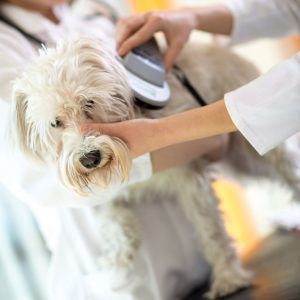Posts Tagged: pet safety
I Think My Pet Ate Something Poisonous

Do you think that could be poisonous?
Have you ever uttered these words wondering if your pet just ate something that could be poisonous? I think we all have at one time or another. It is not a good feeling! The situation is only compounded when your pet ingests something questionable AFTER your veterinarian has closed for the day or on the weekend.
Does poisonous always equal emergency?
If you suspect your pet could have ingested something poisonous it could very well be an emergency, so the answer is maybe. During emergencies, time is of the essence so I am going to walk you through what you should do if this ever happens to you.
Become familiar with common pet poisons
First, you should become familiar with some common pet toxins. Our website features an article that contains some of the top pet poisons called in to the ASPCA Pet Poison Control. You can visit that article to learn more about these common but sometimes deadly poisonous items for pets.

- Over the counter human medication
- Human prescription medications
- Chocolate
- Mouse and rate poisoning
- Xylitol
- Grapes and raisins
- Vitamin D overdose
- Onions and garlic
- Alcohol
- Caffiene
- FOR CATS: Lilies (Lilium species)
- FOR CATS: Spot-on-flea/tick medication (especially over-the-counter brands that contain pyrethrins)

Some plants are poisonous too
These toxins represent a small sampling of things that pets ingest that end up to be poisonous. Some plants are more toxic to cats than dogs or vice versa. You can find a complete list at the ASPCA Pet Poison Control website. One plant that we have a lot of in the San Antonio area is Sago Palm. Sago Palms are extremely poisonous to dogs if they ingest any part of the plant. The seed or “nut” of the plant is the most toxic part of the plant. Ingestion of this plant can result in liver failure within 2-3 days.

Become familiar with the ASPCA Pet Poison Control Website
This list is by no means exhaustive so your best bet is to check the ASPCA Pet Poison Control (APPC) website if you are considering new plants in your house or yard, or using chemicals for your yard or for controlling pests. You can get quick access to the ASPCA Pet Poison Control website via our app. Visit our website for a link to download our hospital app.
We know it’s poisonous and an emergency, so now what?
Now that you know what things to avoid, let us go back to what to do if you have an emergency with one of these poisons. When your pet ingests something that you think may be poisonous, it is everyone’s first instinct to call your veterinarian. Your first call should actually be to ASPCA Pet Poison Control.
Step 1, call the pet poison experts
The ASPCA hotline staffs veterinary technicians, Veterinarians and Veterinary Toxicologists to help you with your emergency. They have a large database of information (more than almost any veterinary hospital) about commonly ingested items and can advise both you and your veterinarian as to the appropriate course of treatment for your pet.
Many times even if you call our office, our advice to you will be to call poison control first and start a case. Because of their expertise we find that working in concert with them gives us the best opportunity to provide life saving care to your pet. So step 1 is to start a case with APPC.
Step 2, call your vet
Step 2 is to call your vet. This is very close second to Step 1. In fact steps 1 and 2 are almost interchangeable but just know that you will probably still have to do both.
Once your pet is at our hospital we can begin treatment. We will outline the treatment plan for your pet as well as let you know what kind of follow on care will be required.
Above all, don’t wait to seek help!
The most important thing you can remember is not to wait when you suspect that your pet may have ingested something poisonous. Seek treatment as soon as you can because in so many cases the sooner we can intervene with treatment, the better. As always, call us with any questions at 210-695-4455.
May Is Microchip Awareness Month
What is a pet microchip?
May is Microchip Awareness Month and we want to help you become aware of the importance of microchips. A pet microchip is a small, electronic device encased in a protective shell.
 A microchip is the size of a grain of rice and is implanted under the skin of pets to provide a means of identification once the pet is scanned. A microchip is the gold standard for reuniting lost pets with owners but only if the chip is registered! Otherwise a microchip cannot be traced back to an owner. Continue…
A microchip is the size of a grain of rice and is implanted under the skin of pets to provide a means of identification once the pet is scanned. A microchip is the gold standard for reuniting lost pets with owners but only if the chip is registered! Otherwise a microchip cannot be traced back to an owner. Continue…
Prevent Pet Poison Accidents
 Poison is a strong word but it is kind of a big deal!
Poison is a strong word but it is kind of a big deal!
This week is National Pet Poison Prevention week and we want you to know that poison can be anything from a toxic chemical to an accidental ingestion of something in a toxic amount. When pets eat things they shouldn’t we often refer their owners to the ASPCA’s Animal Poison Control hotline. This hotline is staffed with veterinary professionals who have access to much more reference information that a typical veterinary hospital. Veterinary toxicologists Continue…
What Do You Know About Parvovirus?
 Why are we talking about parvovirus right now? The answer is because parvovirus has been making the rounds in San Antonio for the last month or so in much higher numbers than we usually see. We don’t really want to test your knowledge of parvovirus but we do want to make sure that you are well educated about it so you can protect your dogs. It is all about what you know about parvovirus.
Why are we talking about parvovirus right now? The answer is because parvovirus has been making the rounds in San Antonio for the last month or so in much higher numbers than we usually see. We don’t really want to test your knowledge of parvovirus but we do want to make sure that you are well educated about it so you can protect your dogs. It is all about what you know about parvovirus.
What Exactly is Canine Parvovirus?
Canine Parvovirus, often just called parvo, is a highly contagious viral disease that can be fatal. This virus attacks the intestinal tract of dogs and puppies causing vomiting and diarrhea. Dogs stop eating and become at high risk for dehydration making hospitalization necessary. Continue…
